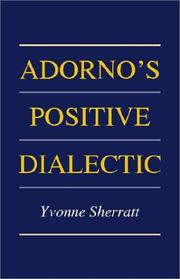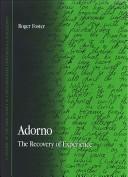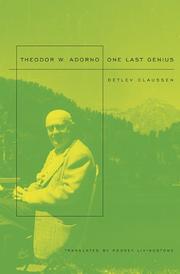| Listing 1 - 10 of 87 | << page >> |
Sort by
|
Book
ISBN: 3736963041 9783736963047 Year: 2020 Publisher: Göttingen
Abstract | Keywords | Export | Availability | Bookmark
 Loading...
Loading...Choose an application
- Reference Manager
- EndNote
- RefWorks (Direct export to RefWorks)
Book
ISBN: 9004321802 Year: 2016 Publisher: Leiden, [Netherlands] ; Boston, [Massachusetts] : Brill-Rodopi,
Abstract | Keywords | Export | Availability | Bookmark
 Loading...
Loading...Choose an application
- Reference Manager
- EndNote
- RefWorks (Direct export to RefWorks)
Adorno and the Concept of Genocide examines the legacy of Critical Theory’s foremost authority on life ‘after Auschwitz.’ As a leading member of the Frankfurt School and one of post-war Europe’s most important public intellectuals, Adorno’s reflections on genocide and its relation to contemporary society achieved a level of urgency and insight that remains unparalleled to this day. Assembled here for the first time in English is a wide-ranging collection of essays on the seminal significance of the concept of genocide for Adorno’s thought, as well as the enduring relevance of that thought for our own time. Contributors include: Babette Babich, Ryan Crawford, Tom Huhn, Osman Nemli, Ulrich Plass, Erik M. Vogt, James R. Watson, Markus Zöchmeister
Book
ISBN: 9781107121591 9781316399002 9781107551749 1107121590 1107551749 1316399001 1316411435 1316413020 1316413225 1316413403 1316413586 1316413942 1316414302 1316414124 9781316414125 9781316414309 Year: 2015 Publisher: Cambridge Cambridge University Press
Abstract | Keywords | Export | Availability | Bookmark
 Loading...
Loading...Choose an application
- Reference Manager
- EndNote
- RefWorks (Direct export to RefWorks)
Theodor W. Adorno's aesthetics has dominated discussions about art and aesthetic modernism since World War II, and continues to inform contemporary theorizing. Situating Adorno's aesthetic theory in the context of post-Kantian European philosophy, Espen Hammer explores Adorno's critical view of art as engaged in reconsidering fundamental features of our relation to nature and reality. His book is structured around what Adorno regarded as the contemporary aesthetician's overarching task: to achieve a vision of the fate of art in the modern world, while demonstrating its unique cognitive potential. Hammer offers a lively examination of Adorno's work through the central problem of what full human self-actualization would require, and also discusses the wider philosophical significance of aesthetic modernism. This book will be a valuable resource for scholars and students of social philosophy, art, and aesthetics.
Book
ISBN: 8024647354 9788024647357 9788024647081 Year: 2020 Publisher: Prague
Abstract | Keywords | Export | Availability | Bookmark
 Loading...
Loading...Choose an application
- Reference Manager
- EndNote
- RefWorks (Direct export to RefWorks)
Book
ISBN: 1438480253 Year: 2020 Publisher: Albany, New York : State University of New York Press,
Abstract | Keywords | Export | Availability | Bookmark
 Loading...
Loading...Choose an application
- Reference Manager
- EndNote
- RefWorks (Direct export to RefWorks)
"This book sets up a dialogue between Emmanuel Levinas and Theodor W. Adorno, using their thought to address today's environmental and social-political situation. The chapters focus on critical natural history and the environmental crisis (part 1), religion, prophecy, and the good (part 2), and an asymmetrical account of equality, liberty, and solidarity (part 3). Eric S. Nelson presents a critical ethics of the material other, addressing the alterities, non-identities, and the good that constitute, interrupt, and reorient ethical and social-political forms of life. This ethics of the material other has significant implications. First, the self is constituted through material and communicative relations to others in "other-constitution" rather than individual or collective self-constitution. Second, encounters with the prophetic "other-power" or transcendence of the good in others-in the ordinary mundanities and sufferings of immanent material life-disturb the economies of the individual ego relishing its own happiness and collective identities that codify themselves through the subjugation and refusal of non-human and human others. Finally, the infinite ethical and social-political demand of others calls for unrestricted solidarities that can transform ethical and social-political sensibilities, if always in relation to the material and communicative conditions of contemporary global capitalism"--
Philosophy. --- Adorno, Theodor W., --- LeÌvinas, Emmanuel.

ISBN: 1107133459 1280434090 0511177917 0511042450 0511148429 0511305311 0511498349 0511045573 9780511042454 9780511045578 9780521813938 052181393X 9780511498343 9781280434099 9786610434091 6610434093 9781107133457 9780511177910 9780511148422 9780511305313 9780521038881 052103888X Year: 2002 Publisher: Cambridge Cambridge University press
Abstract | Keywords | Export | Availability | Bookmark
 Loading...
Loading...Choose an application
- Reference Manager
- EndNote
- RefWorks (Direct export to RefWorks)
This book offers an interpretation of the work of Theodor Adorno. In contrast to the conventional view that Adorno's is in essence a critical philosophy, Yvonne Sherratt traces systematically a utopian thesis that pervades all the major aspects of Adorno's thought. She places Adorno's work in the context of German Idealist and later Marxist and Freudian traditions, and then analyses his key works to show how the aesthetic, epistemological, psychological, historical and sociological thought interconnect to form a utopian image. The book will be eagerly sought out by students and specialists in philosophy, social and political theory, intellectual history, literary theory and cultural studies.
Adorno, Theodor W., --- Adorno, Theodor W. --- Wiesengrund, Theodor, --- Wiesengrund-Adorno, Theodor, --- Adorno, Teodor V., --- Adorŭno, --- אדורנו, תאודור --- אדורנו, ת. ו. --- Adorno, Th. W. --- 1 ADORNO, THEODOR W --- 1 ADORNO, THEODOR W. Filosofie. Psychologie--ADORNO, THEODOR W. --- Filosofie. Psychologie--ADORNO, THEODOR W. --- Filosofie. Psychologie--ADORNO, THEODOR W --- Arts and Humanities --- Philosophy

ISBN: 0791479498 1435611829 9781435611825 9780791472095 9780791479490 0791472094 Year: 2007 Publisher: Albany State University of New York Press
Abstract | Keywords | Export | Availability | Bookmark
 Loading...
Loading...Choose an application
- Reference Manager
- EndNote
- RefWorks (Direct export to RefWorks)
In Adorno, Roger Foster argues that there is a coherent critical project at the core of Adorno's philosophy of language and epistemology, the key to which is the recovery of a broader understanding of experience. Foster claims, in Adorno's writings, it is the concept of spiritual experience that denotes this richer vision of experience and signifies an awareness of the experiential conditions of concepts. By elucidating Adorno's view of philosophy as a critical practice that discloses the suffering of the world, Foster shows that Adorno's philosophy does not end up in a form of resignation or futile pessimism. Foster also breaks new ground by placing Adorno's theory of experience in relation to the work of other early twentieth-century thinkers, in particular Henri Bergson, Marcel Proust, Edmund Husserl, and early Wittgenstein.
Adorno, Theodor W., --- Adorno, Theodor W. --- Wiesengrund, Theodor, --- Wiesengrund-Adorno, Theodor, --- Adorno, Teodor V., --- Adorŭno, --- אדורנו, תאודור --- אדורנו, ת. ו. --- Adorno, Th. W. --- Philosophy, German

ISBN: 0674029593 9780674029590 9780674026186 0674026187 Year: 2009 Publisher: Cambridge, MA
Abstract | Keywords | Export | Availability | Bookmark
 Loading...
Loading...Choose an application
- Reference Manager
- EndNote
- RefWorks (Direct export to RefWorks)
This book gives us our first clear look at how the man and his moment met to create "critical theory." An intimate picture of the quintessential twentieth-century transatlantic intellectual, the book is also a window on the cultural ferment of Adorno's day-and its ongoing importance in our own.
Philosophers --- Philosophy, Modern --- Adorno, Theodor W., --- Adorno, Theodor W. --- Wiesengrund, Theodor, --- Wiesengrund-Adorno, Theodor, --- Adorno, Teodor V., --- Adorŭno, --- אדורנו, תאודור --- אדורנו, ת. ו. --- Adorno, Th. W.
Book
ISBN: 0801469279 1322523169 0801469287 9780801469282 9780801452369 0801452368 9780801478987 0801478987 9780801469275 9781322523163 Year: 2013 Publisher: Ithaca, NY
Abstract | Keywords | Export | Availability | Bookmark
 Loading...
Loading...Choose an application
- Reference Manager
- EndNote
- RefWorks (Direct export to RefWorks)
A discussion of Theodor Adorno's Aesthetic Theory is bound to look significantly different today than it would have looked when the book was first published in 1970, or when it first appeared in English translation in the 1980's. In The Fleeting Promise of Art, Peter Uwe Hohendahl reexamines Aesthetic Theory along with Adorno's other writings on aesthetics in light of the unexpected return of the aesthetic to today's cultural debates. Is Adorno's aesthetic theory still relevant today? Hohendahl answers this question with an emphatic yes. As he shows, a careful reading of the work exposes different questions and arguments today than it did in the past. Over the years Adorno's concern over the fate of art in a late capitalist society has met with everything from suspicion to indifference. In part this could be explained by relative unfamiliarity with the German dialectical tradition in North America. Today's debate is better informed, more multifaceted, and further removed from the immediate aftermath of the Cold War and of the shadow of postmodernism. Adorno's insistence on the radical autonomy of the artwork has much to offer contemporary discussions of art and the aesthetic in search of new responses to the pervasive effects of a neoliberal art market and culture industry. Focusing specifically on Adorno's engagement with literary works, Hohendahl shows how radically transformative Adorno's ideas have been and how thoroughly they have shaped current discussions in aesthetics. Among the topics he considers are the role of art in modernism and postmodernism, the truth claims of artworks, the function of the ugly in modern artworks, the precarious value of the literary tradition, and the surprising significance of realism for Adorno.
Aesthetics, German --- Adorno, Theodor W., --- Aesthetics. --- Adorno, Theodor W. --- Wiesengrund, Theodor, --- Wiesengrund-Adorno, Theodor, --- Adorno, Teodor V., --- Adorŭno, --- אדורנו, תאודור --- אדורנו, ת. ו. --- Adorno, Th. W.
Book
ISBN: 1847603548 9781847603548 9781847603562 9781847603579 1847603564 1847603572 1847603556 9781847603555 Year: 2015 Publisher: Penrith [England]
Abstract | Keywords | Export | Availability | Bookmark
 Loading...
Loading...Choose an application
- Reference Manager
- EndNote
- RefWorks (Direct export to RefWorks)
Adorno, Theodor W., --- Adorno, Theodor W. --- Wiesengrund, Theodor, --- Wiesengrund-Adorno, Theodor, --- Adorno, Teodor V., --- Adorŭno, --- אדורנו, תאודור --- אדורנו, ת. ו. --- Adorno, Th. W.
| Listing 1 - 10 of 87 | << page >> |
Sort by
|

 Search
Search Feedback
Feedback About UniCat
About UniCat  Help
Help News
News